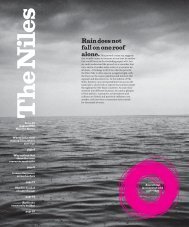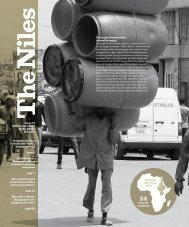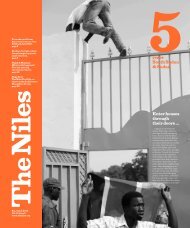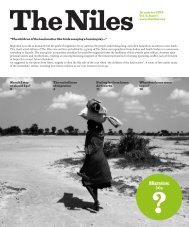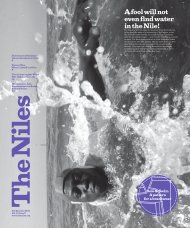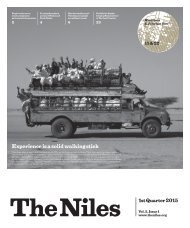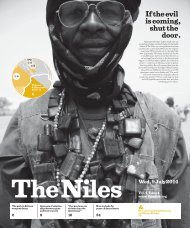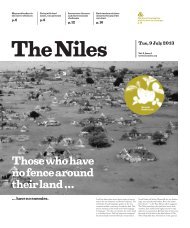When deeds speak, words are nothing
Speaking about sustainable development is easy. Acting sustainably is another matter. And now the evidence is unequivocal: Mankind’s impact on nature is causing the climate to change rapidly and drastically, threatening the environment and the very resources we need to survive. Aware that humanity is careening close to the edge, The Niles correspondents set out to explore where and how people in the Nile Basin region rethink. So much of their findings for now: We are an endlessly innovative species. Cooperation is our superpower. When deeds speak, words are nothing.
Speaking about sustainable development is easy. Acting sustainably is another matter. And now the evidence is unequivocal: Mankind’s impact on nature is causing the climate to change rapidly and drastically, threatening the environment and the very resources we need to survive. Aware that humanity is careening close to the edge, The Niles correspondents set out to explore where and how people in the Nile Basin region rethink. So much of their findings for now: We are an endlessly innovative species. Cooperation is our superpower. When deeds speak, words are nothing.
Create successful ePaper yourself
Turn your PDF publications into a flip-book with our unique Google optimized e-Paper software.
“Lake Victoria
is under
tremendous
pressure.”
Paper bags, for instance, can require
400 percent more energy to make, not to
mention the harvesting of trees and the use
of harmful chemicals in production. Growing
cotton “requires land, huge quantities of
water, chemical fertilisers and pesticides”,
says Swai.
Biodegradable bags, perhaps surprisingly,
could be “the worst option” in terms of their
impact on climate, harm to soil, water pollution,
and toxic emissions.
Eco Ways Uganda announced it had found
a novel way to reduce plastic waste by collecting
discarded bags and bottles and upcycling
them into new products, such as tables and
fence poles.
Like Editrith, Eco Ways is an emerging
environmental entrepreneur setting up collection
points in the area. Observers argue that
such approaches should be intensified to help
shrink the number of ugly landfill spots on
the landscape which teem with plastic waste.
Nearly 18 months after the Flipflopi
made its first historical journey from Lamu,
Kenya, to Zanzibar, Tanzania, the world’s first
percent recycled plastic sailing boat (dhow)
made another historic voyage, this time on
Lake Victoria.
Over four weeks in early 2021, the Flipflopi
sailed around Lake Victoria, highlighting
the impact of pollution on this vital ecosystem
and engaging governments, business
leaders, community leaders, conservationists,
and students on viable solutions for the
pollution menace.
“There is clear evidence that the ecology
of Lake Victoria is under tremendous pressure.
The lake plays a key role in facilitating community
life in the East African region. I call
on the governments of Kenya, Tanzania, and
Uganda to strengthen their cooperation to
enhance the improvement of this important
raw material. UNEP and its partners are
ready to provide the necessary support to
achieve this,” says Juliette Biao Koudenoukpo,
UNEP Director and Representative for the
African Region.
In July, Kenya Coast Guard Service (KCGS)
described the dumping of plastic waste in Lake
Victoria as alarming. Meanwhile, experts have
suggested that Kenya and Tanzania set up plants
or nets on all the major drainage channels
to trap litter before it reaches the lake. In San
Francisco, California, authorities have used
such traps to prevent plastic waste from
reaching the sea.
The Flipflopi is the world’s very
first 100 percent recycled plastic
dhow (sailing boat), covered in
30,000 multicoloured flip flops.
Photo: Redningsselskapet /
Sofi Lundin
19









